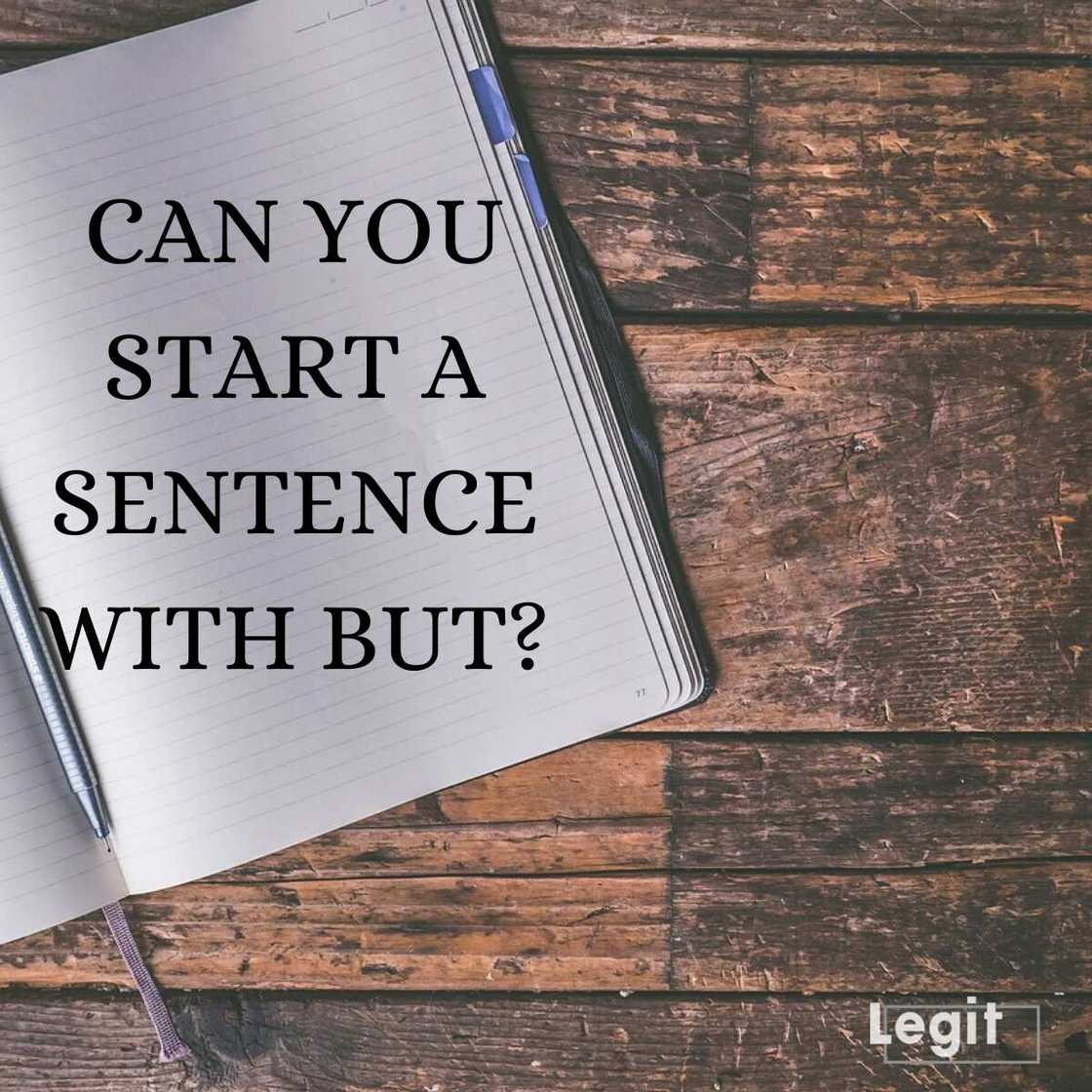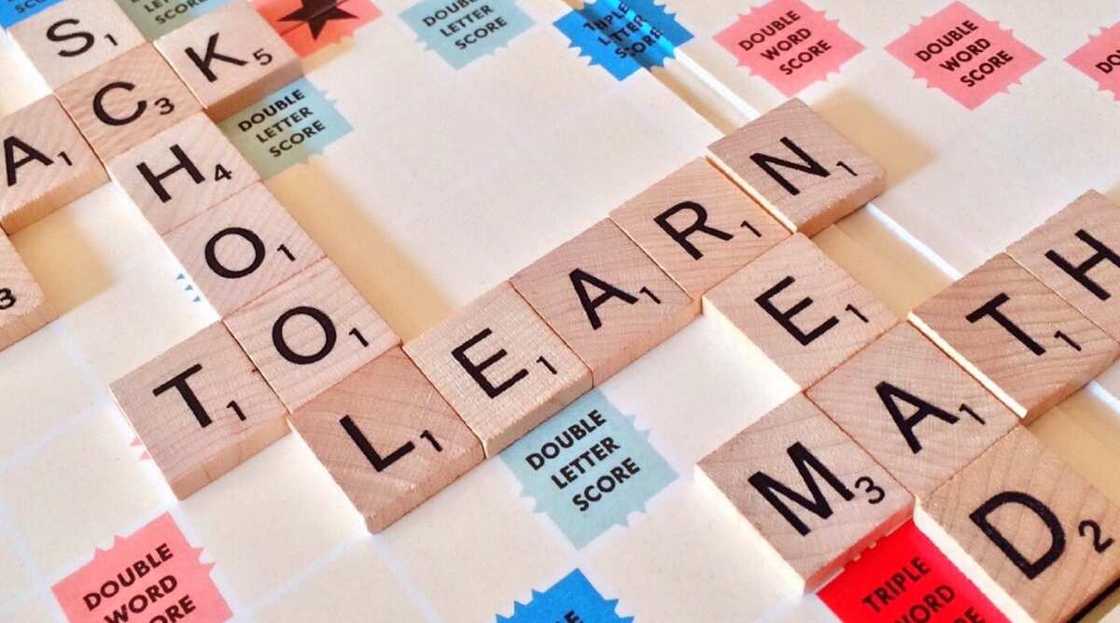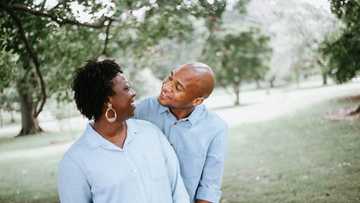Can you start a sentence with but: A grammatical explanation
One of the most deeply ingrained grammar rules involves the usage of the word 'but'. For a long time, teachers have told their students that they cannot use conjunctions at the beginning of sentences. If you asked your English teacher "Can you start a sentence with but?" you would be met with a resounding 'No!' But where did this 'rule' even come from? And does it hold water?

Source: Original
Can I start a sentence with but? Yes, you actually can. Contrary to what your English teacher taught you, there is nothing wrong with starting a sentence with but, and this is why.
Can you start a sentence with but? Why it's okay
Have you ever found yourself asking, "Are you allowed to start a sentence with but?" You are not alone. To answer you, it is perfectly okay to begin a sentence with but.
By Merriam-Webster's definition, a conjunction joins together clauses, phrases, words, or sentences. This proves that it actually is okay to use but at the beginning of a sentence.
It is totally fine to use a coordinating conjunction to launch an independent clause (a group of words with a subject and a verb that could stand alone as a sentence).
Take the following sentences as examples:
- Mary ran errands all day in the sweltering heat to ensure that she could leave town the next morning for her vacation. But that night she lay in bed remembering all the tasks she had not yet completed.
- Mary ran errands all day in the sweltering heat to ensure that she could leave town the next morning for her vacation. But that night lay in bed remembering all the tasks she had not yet completed.
While the first example is totally correct (as but has been used to launch an independent clause), the second one is erroneous because of the sentence fragment (a fragment because it is missing a subject).
There are even more reasons why you should not be afraid of using but at the beginning of a sentence. For one, using and/but at the beginning of a sentence makes it more forceful and graceful.
In fact, it is almost always better than beginning with 'however' or 'additionally,' which may sound somewhat pretentious.

Source: UGC
What you need to consider before using but at the beginning of a sentence
Even though it is okay to use but at the beginning of a sentence, there are some things you need to consider:
- Consider your audience - If you are writing an academic paper, you better stick to the 'rules' given by your professor or teacher to avoid getting penalized for something you could avoid. If your teacher says that you cannot use but at the beginning of a sentence, follow their directive.
- If you decide to use but at the beginning of a sentence, you need to make sure that what follows is an independent clause, i.e., it can stand alone.
- Sentences that begin with conjunctions (such as and, but, or, so, yet) sound less formal than those that begin with conjunctive adverbs (such as however, moreover, moreover, thus, and furthermore)
- If the sentence would function just as well without the conjunction, then write it without the conjunction.
- If the two ideas work better as a compound sentence, then combine them.
These are the things you need to consider when using but in a sentence this way.
Where did this rule come from?
Where did this 'rule' against using but at the beginning of a sentence come from? In The Story of English in 100 Words, David Crystal writes:
During the 19th century, some schoolteachers took against the practice of beginning a sentence with a word like but or and, presumably because they noticed the way young children overused them in their writing.
But instead of gently weaning the children away from overuse, they banned the usage altogether! Generations of children were taught they should 'never' begin a sentence with a conjunction. Some still are.
Proof that you can use but at the beginning of a sentence
Here are some texts that prove why it's okay to use but at the beginning of a sentence
- Chicago Manual of Style: "There is a widespread belief—one with no historical or grammatical foundation—that it is an error to begin a sentence with a conjunction such as and, but or so. In fact, a substantial percentage (often as many as 10 percent) of the sentences in first-rate writing begin with conjunctions. It has been so for centuries, and even the most conservative grammarians have followed this practice."
- Kingsley Amis, The King's English (1997): "And the idea that and must not begin a sentence, or even a paragraph, is an empty superstition. The same goes for but. Indeed either word can give unimprovably early warning of the sort of thing that is to follow."
- Professor Jack Lynch, Associate Professor of English, Rutgers University, New Jersey: "Contrary to what your high school English teacher told you, there's no reason not to begin a sentence with but or and; in fact, these words often make a sentence more forceful and graceful. They are almost always better than beginning with however or additionally."
- Sir Ernest Gowers, The Complete Plain Words (1954): "There used to be an idea that it was inelegant to begin a sentence with and. That idea is now as good as dead. And to use and in this position may be a useful way of indicating that what you are about to say will reinforce what you have just said."
- RW Burchfield, New Fowler's Modern English Usage: "There is a persistent belief that it is improper to begin a sentence with and, but this prohibition has been cheerfully ignored by standard authors from Anglo-Saxon times onwards."
- Modern American Usage (1966): "A prejudice lingers from the days of schoolmarmish rhetoric that a sentence should never begin with and. The supposed rule is without foundation in grammar, logic, or art."

Source: UGC
Examples of the usage of but at the beginning of a sentence
Many popular texts use conjunctions at the beginning of sentences. Some popular excerpts include:
- Genesis, Chapter 1, The Bible, King James version: "In the beginning God created the heaven and the earth. And the earth was without form, and void; and darkness [was] upon the face of the deep. And the Spirit of God moved upon the face of the waters. And God said, Let there be light: and there was light. And God saw the light, that [it was] good: and God divided the light from the darkness. And God called the light Day, and the darkness he called Night. And the evening and the morning were the first day."
- The Economist: "Nonetheless Canada has many good reasons to feel pleased with itself. Its constitutional motto of “peace, order and good government” may not set the pulse racing in the manner of America’s “life, liberty and the pursuit of happiness”. Most Americans probably think of it as a dull old neighbour, when they think of it at all. But peace, order and good government are solid virtues, and still rare enough not only to make Canadians count these blessings but also for millions of people from less orderly places to flock to Canada to enjoy them too."
- The US Constitution Article. IV, Section 1: "Full Faith and Credit shall be given in each State to the public Acts, Records, and judicial Proceedings of every other State. And the Congress may by general Laws prescribe the Manner in which such Acts, Records and Proceedings shall be proved, and the Effect thereof."
- Eats, Shoots and Leaves, Lynn Truss, p. 7: "But best of all, I think, is the simple advice given by the style book of a national newspaper: that punctuation is 'a courtesy designed to help readers to understand a story without stumbling.'"
- Harry Potter and the Sorcerer's Stone, J. K. Rowling, p. 3: "But on the edge of town, drills were driven out of his mind by something else."
- The American Language: An Inquiry into the Development of English in the United States, H.L.Mencken (1921): “But its chief excuse is its human interest, for it prods deeply into national idiosyncrasies and ways of mind, and that sort of prodding is always entertaining.”
- The Associated Press Stylebook (2007), p. 326: "But use the comma if its omission would slow comprehension…"
- Watch Your Language, Theodore Bernstein, p. 4: "But when he is writing for the newspaper he must fit himself into the newspaper's framework."
- Preface to Watch Your Language, Jacques Barzun: "But I am not inviting the reader to witness a tender of compliments over what may seem like a mere byproduct of professional skill."
- The Elements of Style, Strunk and White (1918 edition): "But whether the interruption be slight or considerable, he must never omit one comma and leave the other."
- Little Women, Louisa May Alcott, page 1: "We can't do much, but we can make our little sacrifices, and ought to do it gladly. But I'm afraid I don't." And Meg shook her head, as she thought regretfully of all the pretty things she wanted.
- Epistle Dedicatory to Man and Superman, Bernard Shaw, 1903, p. 2: "But you must not expect me to adopt your inexplicable, fantastic, petulant, fastidious ways…."
- Pride and Prejudice, Jane Austen, p. 1: "My dear Mr. Bennet," said his lady to him one day, "have you heard that Netherfield Park is let at last?" Mr. Bennet replied that he had not. "But it is," returned she; "for Mrs. Long has just been here, and she told me all about it."
- FDR, First Inaugural Address, March 4, 1933: "But it may be that an unprecedented demand and need for undelayed action may call for temporary departure from that normal balance of public procedure."
- The Gettysburg Address, Abraham Lincoln (1863): "But in a larger sense, we cannot dedicate, we cannot consecrate, we cannot hallow this ground."
- Hamlet, William Shakespeare, Ii: Horatio: "So have I heard and do in part believe it. But look, the morn, in russet mantle clad, Walks o’er the dew of yon high eastward hill."

Source: UGC
FAQs about how to use but in a sentence
Here is more useful information about the usage of but.
Can you start a sentence with but in academic writing?
The AP Stylebook doesn't prohibit starting sentence with but, although it does urge moderation.
It writes:
There's no AP Stylebook rule against starting a sentence with a conjunction. And it works well in some instances. But don't overuse it. Or readers will be annoyed.
The Chicago Manual of Style also allows it.
Can you start a sentence with but in AP style?
As mentioned above, the AP Stylebook does not prohibit it.
What can I say instead of but?
If you want to avoid the word at all costs, then there are other words that you can use instead of but in a sentence. They include:
- Nevertheless
- Yet
- However
- Though
- Although
- Still
- All the same
- Be that as it may
- But still
- Despite that
- Even so
- For all that
- In spite of that
- Nonetheless
- Howbeit
- Just the same
- Regardless
- Notwithstanding
- Still and all
- Natheless
- Withal
- But nevertheless
- Except
- Instead
- At any rate
- On the other hand
- At the same time
- After all
- Even though
Is there a comma after but?
There is a comma after but when you use an interrupter. An interrupter is a little word or phrase that you insert into a sentence to create emphasis, tone, or emotion.
An interrupter can be taken out of a sentence, and the sentence will still retain its original meaning. Examples of sentences with interrupters include:
- But, of course, she can't go on her own without a chaperone.
- But, surprisingly, he didn't hold back when he shouted his anger.
- But, on some occasions, you just have to figure things out on your own.
In the examples above, of course, surprisingly, and on some occasions are interrupters.
On the other hand, you should put a comma before but only when but is connecting two independent clauses.
If someone asks you, "Can you start a sentence with but?" go ahead and tell them that it's okay and that this 'rule' can be bent on certain occasions.
Source: Legit.ng








